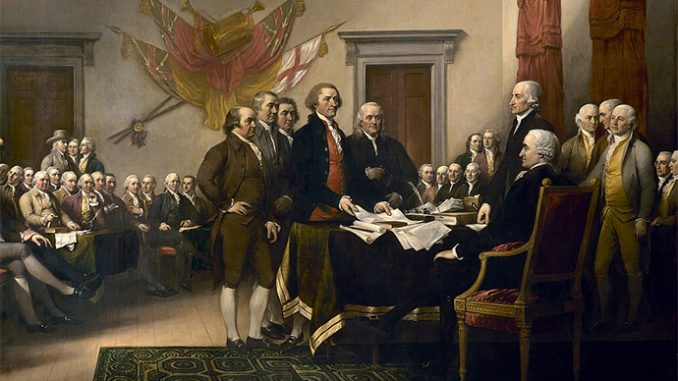
In the twelve months leading up to next year’s American semiquincentennial, the tale will frequently be told of Benjamin Franklin’s encounter with Philadelphia matron Elizabeth Willing Powel, who asked, as Franklin left the Constitutional Convention: “Well, Doctor, what have we got — a republic or a monarchy?” To which the 81-year-old sage replied, “A republic, if you can keep it.” That caveat remains as true today as when Franklin engraved it in the national memory on September 17, 1787.
“Keeping it” is, indeed, a task for “We, the People,” the phrase that begins the Preamble of the Constitution Franklin helped write. For “We, the People” were the progenitors of the United States. John Adams put this succinctly in an 1818 letter, written as the country approached its golden jubilee: “But what do We mean by the American Revolution? Do We mean the American War? The Revolution was effected before the War commenced. The Revolution was in the Minds and Hearts of the People.”
So if the republican convictions and sentiments of “We the People” deteriorate, the republic is in danger.
Are we amidst such a moment, a year before the national celebration of “America 250”?
Serious, self-inflicted challenges to our republican and constitutional form of government have not been lacking over the past two hundred fifty years. These have often taken the form of governmental overreach by autocratically inclined presidents: Woodrow Wilson’s harassment and lock-up of antiwar protesters and FDR’s internment of unimpeachably patriotic Japanese-American citizens are two sorry twentieth-century examples. But as Mark Helprin pointed out in the Wall Street Journal six weeks ago, the current danger to republican constitutionalism is rooted in the “people’s lack of supervision in granting agency and approval to elected officials high and low who depart from the principles of the Founding and the discipline and design of the Constitution.”
Less elegantly: “We, the People” are dropping the ball.
How?
The recent record of such defaults in “lack of supervision” spans several presidential administrations and is wholly bipartisan in character (or lack thereof). Why is it, to cite Helprin again, that “We, the People” tolerate it when “a sheepish congressional majority behaves like a battered wife; when judges legislate and executive agencies judge; and when courts inconvenience the executive or Congress and what follows are threats to impeach or otherwise bind judges…”?
Or to get down to immediate cases:
Why do those grateful for several initiatives taken by the current administration not recognize that the administration demeans itself (and the country) when the president and his former Designated Government Shrinker, Mr. Musk, behave like two kindergarten brats fighting over the paste sticks — which, beyond the embarrassment caused, signals a profound lack of seriousness to our enemies in Moscow, Beijing, Tehran, and elsewhere?
Why do those who lament the Democratic Party’s enthrallment to woke culture and politics not ostracize and then consign to political oblivion the flamethrower politicians whose rhetoric helped make possible the antisemitic outrages in Harrisburg, Washington, and Boulder?
And where is Congress, that putatively independent branch of the federal government? One sometimes gets the impression that Article One of the Constitution has been virtually repealed in the minds of many Senators and Representatives, who seem to imagine themselves as mechanical tote boards sent to the Capitol to register whatever their loudest constituents demand in social media screeds — or to approve whatever the Big Guy at the other end of Pennsylvania Avenue decrees. When was the last time “We, the People” let our elected representatives know that we expect mature, considered judgment from them, not a wetted forefinger raised into the political winds?
A year short of its 250th birthday, the United States remains a marvel: a continental-wide republic of 340 million people that, for all the defects just noted, remains the world’s most egalitarian society, the world center of innovation, and the free world’s best hope for leadership in confronting tyrannies with aggression on their minds. Still, “We, the People” have a lot of work to do to get our act together, so that we can celebrate “America 250” with gratitude and hope rather than soured spirits.
That national civic renewal will begin when, one by one, “We, the People” rebuild the link between freedom and virtue; recommit themselves to republican constitutionalism; refuse to countenance demagoguery by holding hold elected officials accountable to adult standards of behavior; and conduct ourselves in debate, public or interpersonal, in a manner befitting the maturity we should have achieved in two and a half centuries of national life.
If you value the news and views Catholic World Report provides, please consider donating to support our efforts. Your contribution will help us continue to make CWR available to all readers worldwide for free, without a subscription. Thank you for your generosity!
Click here for more information on donating to CWR. Click here to sign up for our newsletter.












